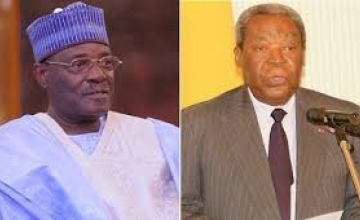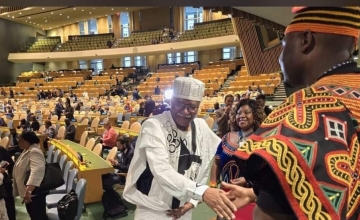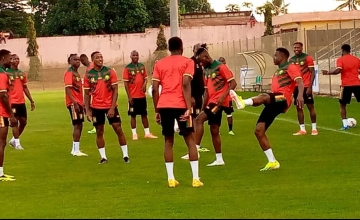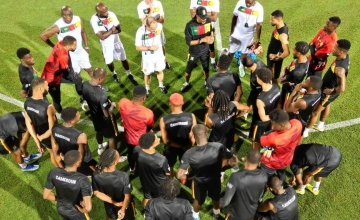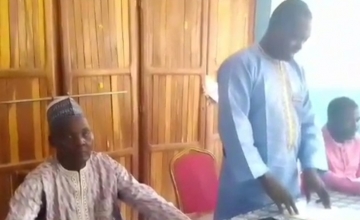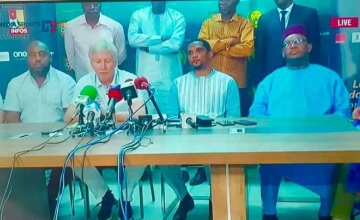
Ekinneh Agbaw-Ebai Nanje S. C. Th.
Consider this: over 55 years after independence and re-unification, there has never been an Anglophone President or an Anglophone Secretary General or Director of Civil Cabinet at the Presidency. Nor has an Anglophone ever held the strategic ministerial portfolio of Defense, Finance, Territorial Administration, Communication, External Relations, National Education or even in charge of the Police, Gendarmerie, the Army and Intelligence services; not even ambassadors to English-speaking countries like the USA and Nigeria.
The Anglophone Problem – When Facts don’t Lie
By Ekinneh Agbaw-Ebai*
By Ekinneh Agbaw-Ebai*
A preacher once told his congregation: "Next week, I plan to preach about the sin of lying. To help you understand my sermon, I want you all to read Mark 17." The following Sunday as he prepared to deliver his sermon, the pastor asked for a show of hands. He wanted to know how many had read Mark 17. Every hand went up. The preacher smiled and said: "Mark has only 16 chapters. I will now proceed with my sermon on the sin of lying." This joke says a lot about human nature, but shows how Francophones are often caught committing the sin of lying about the Anglophone problem. Francophones are wont to wish into reality what is not there, and to deny the truth when it suits them. Lying is a sin that was committed by five Francophone Ministers who told the world at a press conference that there is no Anglophone problem in Cameroon. The integrity deficit associated with lying about the Anglophone problem is a travesty that insults and diminishes every Cameroonian and must stop.
The point must therefore be made, and with emphasis, that there is an Anglophone problem but the problem is deeply embedded in the asymmetrical political structure of the country, which has led to institutional paralysis engendered by leadership failure. Anglophones are divided over the Anglophone problem, just as Francophones are united in their bellicosity and belligerence towards Anglophones whom they cast as treasonable felons and secessionists who cannot be trusted. Francophones have used this self-fulfilling fallacy as an excuse to exclude Anglophones from the commanding heights of decision-making and treat them as second class citizens. But facts don’t lie like the lying laity of Mark 17.
Consider this: over 55 years after independence and re-unification, there has never been an Anglophone President or an Anglophone Secretary General or Director of Civil Cabinet at the Presidency. Nor has an Anglophone ever held the strategic ministerial portfolio of Defense, Finance, Territorial Administration, Communication, External Relations, National Education or even in charge of the Police, Gendarmerie, the Army and Intelligence services; not even ambassadors to English-speaking countries like the USA and Nigeria. For a region that represents about 20% of the population, accounting for over 60% of GDP, the fact that the lone oil refinery named in French (SONARA) is in Anglophone Cameroon, yet has been run by Francophone general managers with a predominantly Francophone workforce since its creation is unacceptable. It just cannot be that there are no competent Anglophones to occupy these positions.
As if that was not enough, higher institutions like the National Polytechnic, ENAM, IRIC, ESSTIC, INJS, IFORD, CUSS, Public Works, ENSPT, IRAD, are heavily laden with French courses; another way of saying, Anglophones need not apply. Although Cameroon is officially a bilingual country where both English and French are equal, when has the president ever made an official address to the nation in English? All official correspondences are in French, even when directed to Anglophones. French is the language used in the administration, police, gendarmerie, army and the courts. Anglophones have to seek translators at their own expense. All road signs are in French and there is not a single word in English on the FCFA currency in circulation; is this constitutional?
The facts and figures of Anglophone marginalization under President Biya are staggering. Of the 700 ministers appointed since Biya took office in 1982, only 76 (10.8%) have been Anglophones. In the current 63-member cabinet, there are only six Anglophones (9%) and only, Philip Ngole Ngwese (2%) out of the 38 Ministers has a cabinet portfolio. There are four Anglophone Secretary Generals (10%) and three Anglophone DAGs (7%) in the central administration. In state corporations, there are less than 15 Anglophones (11%) out of over 130 general managers. Of the over 130 Board chairmen of state corporations, there are only 10 Anglophones (7%). Of the 58 SDOs in the country, there six Anglophones (10%) and only three of the nation’s 33 generals in the Armed Forces are Anglophones.
The picture in the judiciary is even more pathetic and scandalous with Francophones occupying all key positions in the Supreme Court - President of the Supreme Court; Attorney General; Head of Judicial Division; Head of Administrative Division; Head of audit Division; Head of Special Criminal Court; Special Attorney Special Criminal Court; Director of Military Justice; Registrar-In-Chief Supreme Court and Secretary General Supreme Court. 58 (39%) of the 148 magistrates in the Southwest are Francophones while 54 (61%) of the 89 magistrates in the legal department in the Southwest are Francophones. Of the 50 magistrates working in Buea (Bench & Legal Department), 20 (40%) are Francophones while 20 (71%) of the 28 magistrates in the legal department in Buea are Francophones. Of the 30 new bailiffs that were appointed in January 2014 in the Southwest, 28 of them (93%) are Francophones.
The situation in the Northwest region is even worse. Of the 128 magistrates in the Northwest, there are 67 Francophones (52 %). Of the 97 magistrates of the legal departments, 64 of them are Francophones, (65.9%); 22 (48.9%) of the 45 magistrates in Bamenda are Francophones. There are 27 magistrates in the legal department in Bamenda of which 21, (77.8%) are Francophones. All the 21 new bailiffs (100%) appointed in January 2014 to the Northwest are Francophones. Comparatively, of the 119 magistrates in Douala, only two (1.7%) are Anglophones. Likewise, only two (1.9%) of the 107 magistrates in Yaoundé are Anglophones. These are very disturbing statistics in a bilingual country with two legal systems!
There is no reference hospital and no functional airport or seaport in Anglophone Cameroon. It is worth recalling that preliminary studies by the consortium charged with the construction of the Chad-Cameroon oil pipeline had established that the project will be cost-effective if the pipeline was built from Doba in Southern Chad to Limbe, which has a natural deep seaport. According to documents from the World Bank and the Washington-based Environmental Defence Fund, the then Secretary General at the Presidency, Joseph Owona re-routed the project to his native Kribi; taking the pipeline through ecologically sensitive areas and increasing the distance by 90 miles and the cost by $2 billion. Owona warned the investors that Limbe was risky because Anglophones might one day agitate for secession and the pipeline will be exposed to sabotage and vandalism.
To add insult to injury, the government has made it a point to assign Francophones who neither speak nor understand English to Anglophone regions. A Francophone DO in Oku, Kamdem Andre once called a meeting with traditional rulers and started speaking in French. Not understanding what he was saying, the Fons started dozing. Feeling snubbed, the angry DO ordered his bodyguards to wake-up the Fons with a slap each and the meeting ended in chaos. DO Kamdem is not an isolated case.
Francophones disrespect Anglophones in positions of authority, even the prime minister, head of government. Francophone ministers either ignore cabinet meetings called by the PM or come late, in breach of standard protocol. When then prime minister, Achidi Achu appointed Raymond Gwanyalla as Director of Customs, the then Finance Minister; a Francophone openly challenged the PM in a flagrant display of insubordination. The Minister not only refused to preside at Gwanyalla’s installation, but ordered a boycott of the event which was heeded by all Francophone Directors in the Ministry of Finance. Surely, nothing like this happens in any country worthy of respect.
As Prime Minister, Peter Mafany Musonge was humiliated by the paymaster general in Yaoundé. Musonge was dealing with a crisis after a timber truck derailed killing dozens, mostly roadside hawkers in the hotbed of Mutengene. Anger was boiling on the streets when President Biya ordered that FCFA 200 million be given to the PM to go help the victims and deceased families. A voucher was established to this effect; with the “visa” of the Finance Minister and the PM’s office and sent to the Yaoundé central treasury, but then paymaster general, Etogo Mbezele refused to pay, ostensibly because the director of the treasury had not “visa” the voucher. The treasury director was vacationing in France and traveled abroad with his “visa.” Informed of Mbezele’s decision, an exasperated Musonge could not help but exclaim in anger and frustration: “Oh these Frogs!” It must be stated in no ambiguous terms that Musonge spoke from the heart. His spontaneous outburst speaks to a deep-seated Anglophone frustration with an erratic system of government, with its consequent value misplacement, the like of which should never be countenanced in any civilized nation.
There are countless instances where Francophones are appointed to boss better educated and qualified Anglophones. It is a tragedy that after fifty-five years of independence and re-unification, we are still talking of Anglophones and Francophones, but that is the sad reality of Cameroon. Anglophones have been treated shabbily; they are asking whether they made the right choice in 1961, since only they were asked if they wanted reunification with Francophones. Despite that fact that East Cameroun was deeply embroiled in a bloody insurgency and terrorism, Anglophones closed their eyes and voted with their hearts. Fifty-five years after that vote, all Anglophones are asking is to be given the opportunity to manage their own affairs but they are being called secessionists and enemies from within, Biafrans, and even asked to go back to Nigeria.
This in itself is demeaning and outlandish. Our strength as a nation lies in our diversity. The bridge towards our future will be built on lessons from the past; hence the government must refrain from assuming that anyone calling for restructuring of the present structure wants to breakup the country. It is not Anglophones who threaten national unity; rather, it is the politics of exclusion and marginalization of Anglophones that poses a threat to peace and stability. Those who see Anglophones as a conquered people should look at these unsettling statistics and learn the right lessons because the mood is very scary but the looming crisis is still avoidable.
=================================================
The Anglophone Problem and a Nation’s Embarrassment
The odious scenes of police brutality captured on social media, were pathetic, disgraceful and reinforces Cameroon’s image as a country with highly dysfunctional institutions where bizarre things can happen.
By Ekinneh Agbaw-Ebai*
No other event lately, perhaps, dramatizes the growing contradictions of Cameroon better than the brigandage witnessed on the streets of Buea and Bamenda with its trail of violence in which lawyers, teachers, university students and innocent civilians were beaten, arrested, tortured, raped and detained by rampaging soldiers acting on “orders from above.” The brutality deployed against Anglophones for exercising their constitutionally guaranteed rights to free speech and peaceful assembly is simply mind-boggling, inexcusable and stand condemned in all ramifications. In the judgment of an average sense of decency, the crude police assault is a moral weakness of asinine proportion that calls into question, the real character of the nation’s leadership. The lawlessness by security forces was an insult to democracy and constitutional rectitude that neither edifies the country, nor the President, on whose desk, the buck stops. Cameroonians deserve full explanation for this unbelievable shame.
To the utter embarrassment of the nation, the images of police brutality which went viral on social media were pathetic, disgraceful and devoid of any perfunctory exaggeration. By any streak of the imagination, this cowardly and barbaric fury towards life, liberty and civility, is one of the most odious image-battering events that only reinforces Cameroon’s international image as a country with highly dysfunctional institutions where bizarre things can happen. Cameroonian leaders at all levels must be hiding their heads in shame. Certainly Anglophones must be allowed to examine the basis of their co-existence. To deny them this right for fear that they may disagree to live together is like building on a shaky foundation.
After many false starts, dashed hopes, and perennially low expectation, Cameroon needs a change of direction and Anglophones want to reset the agenda. Government apologists denouncing the ongoing protests as a rally of miscreants must realize that the use of overwhelming force is a very risky strategy that could backfire and, in the worst case scenario, crystallize into the formation of armed groups in legitimate self-defense of Anglophones. Once that line is crossed, the clamors for secession will only grow louder. History is dotted with too many such examples and Cameroon cannot afford to go down this route. The government claims without any evidence that the protests are the handiwork of unseen “foreign hands” and refuse to acknowledge that the motivations for the protests rest on the skewed nature of Cameroon as a country. For many years, Francophone-led governments from Ahidjo to Paul Biya have maintained a portentous imbalance and inequitable structure that marginalizes Anglophones and disfavors meritocracy. They have glossed over the continuous discrimination of Anglophones in a progressive fashion to a point of assimilation. And by so doing they have foisted a forced unanimity.
With the groundswell of protests, the unity of Cameroon, for want of a suitable metaphor, seems to be held at gunpoint. Obviously, these protests point to issues that have not been resolved. Unfortunately, the government response has been violence and provocative belligerence, instead of finding a midway for which the nation’s diversity can be respected, and a sense of belonging maintained without making anyone feel any loss of their identity. The government must cease and desist from perpetrating acts of violence against Anglophones as this risk enthroning instability that could dismember the country.
Notwithstanding, it is simplistic to view the demonstrations as an event orchestrated by disgruntled elements reliving an inglorious reverie from some botched re-unification experiment because the deeper import of the protests transcend the Anglophone agenda. Protest is a living philosophy of justice that appears wherever and whenever oppression, impunity, injustice and structural violence rear their heads. In a democracy, the people alone matter; peaceful protests is an integral part of democracy; people should air their views, however jaundiced. What is going on is symbolic of the discontent experienced by many ethno-political interests for whom the Cameroon question remains unanswered.
That Cameroon as a nation is living a lie or its rulers are living in denial is not in doubt. It wants to be a prosperous and politically stable country, yet it is holding down this potential for prosperity and stability by maintaining a supercilious, garrisoned, centralized government, whilst paying lip service to regional decentralization. Nothing is working in the country and the bond that binds the ethnic nationalities appears tenuous, if not snapping, fundamentally threatening the unity of the country. The unity in diversity hitherto advertised as “Africa in miniature” has been supplanted by diversity in unity, such that Cameroonians see themselves first in the mold of their ethnic nationality. This explains why Cameroon is politically weak and structurally fragile, giving rise to negative and frightening prognostications.
Without equivocation, all is not well with the country. For too long, successive Francophone-led governments have undermined the essential differences in the various interests of the Cameroonian people; and so unresolved matters about the aspirations of Cameroon’s heterogeneous interests have become a ticking time bomb. To assume that these do not exist, or to gloss over them is to play the ostrich like Fame Ndongo stuck in clannish grand-standing; wearing the garb of an ethnic jingoist and pontificating about a united Cameroon. The truth of the matter is that the current structure of Cameroon today, holds down the levers of development in the country, stunts its growth, truncates its progress and actually threatens its unity. The present political structure with its insensitive centripetal exertions provides vents for sundry injustices in the polity that must be corrected to liberate the nation’s full potentials.
For the avoidance of doubt, Anglophones have a right to determine whether the political configuration of the country as it stands today should remain as it is in form and in character; whether the structures of the existing order, are suitable for the nation’s complexities as a bilingual, multi-ethnic and multi-religious nation. Cameroon is a great country waiting to happen and needs men and women who would make sacrifices for her greatness. It is indeed unfortunate that Francophone political leaders seem to wittingly or unwittingly consider Anglophones as “enemies in the house” rather than as Cameroonians with a different vision of how the country can be run. The Francophone political class needs to learn and understand that leadership is not about ethnic domination or selfish power equation; it is rather a disposition of moral strength and sacrifice to act in the public interest. Rather than exacerbate tension and heat the polity unnecessarily, the government should find answers to the thorny issues that created this monstrosity in the first place.
The ongoing violence does little credit to the image of Cameroon’s democracy. The depth of suspicion and ill feeling towards Anglophones is unhealthy for a nation in distress. Too much pain has been inflicted and certain pertinent points need to be made. One is that Anglophones have been treated as “beasts of no nation” in a way that is provocative and vexatious. Besides, if the government thinks brute force is the appropriate response to legitimate Anglophone grievances; that is a huge mistake as history beckons with lessons. Anglophones may have borne the provocation with admirable equanimity, but let the government be under no illusions: Anglophones have been mightily insulted and never again should it happen. The discrimination and marginalization of Anglophones has had its day and must now end in the interest of peace and stability. In the meantime, the government should spare Cameroonians the noise and let Anglophone voices be heard as they cry in agony for better governance.
* Ekinneh Agbaw-Ebai is a public intellectual and graduate of Harvard University John F. Kennedy School of Government where he was Managing Editor of the Harvard Journal of African-American Public Policy. A former Research Analyst for Central Africa with Freedom House, he is a consultant and lives in Boston, Massachusetts, USA. Talk back at [email protected].

